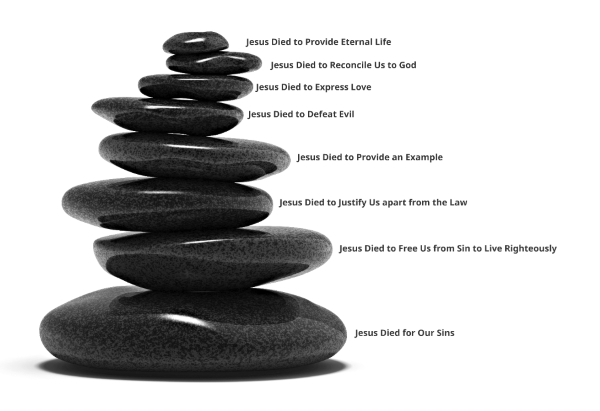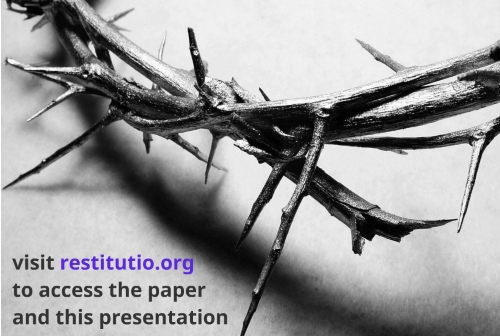Podcast: Play in new window | Download
Subscribe: Spotify | Email | RSS
 Thinking Christians have theorized in many ways about “atonement.” Just what it is about Jesus’s death on the cross that reconciles humans to their maker? Was it a ransom paid to the devil? An example for us to imitate ? A substitution, wherein Jesus absorbed God’s wrath in your place, enabling God to forgive you? A victory over the forces of evil? Or what?
Thinking Christians have theorized in many ways about “atonement.” Just what it is about Jesus’s death on the cross that reconciles humans to their maker? Was it a ransom paid to the devil? An example for us to imitate ? A substitution, wherein Jesus absorbed God’s wrath in your place, enabling God to forgive you? A victory over the forces of evil? Or what?
In this talk from the 2016 Theological Conference, Pastor Sean Finnegan discusses the biblical data about why Jesus died, and lays out seven options for understanding Jesus’s unique atonement, then criticizing each. At the end, he takes a stab at constructing a theory faithful to the whole biblical witness.
Does Pastor Finnegan leave out any important option?
And do you agree with his own positive suggestions, presented briefly towards the end?
- Video of this presentation by Carlos and Sarah Jimenez (cued to the Q&A time)
- the Prezi slides for this presentation and full paper on which this presentation is based
- restitutio.org
- Restitutio Podcast archive
- Living Hope International Ministries
- christianmonotheism.com
- Truth Matters radio show
- Conference website
- Sir Anthony Buzzard’s Restoration Fellowship
- Peter Abelard (1079-1142)
- Anselm (1033-1109)
- Dr. Robin Collins, “Understanding Atonement: A New and Orthodox Theory“
- Hugo Grotius (1583-1645)
- Dr. Joshua Thurow, “Communal Substitutionary Atonement,” Journal of Analytic Theology, vol 3 (May 2015).
- podcast 92 – Dr. Joshua Thurow on objections to atonement theories
- podcast 91 – Dr. Joshua Thurow on theories of the atonement
- podcast 26 – Pastor Sean Finnegan on “the Holy Spirit” – Part 2
- podcast 25 – Pastor Sean Finnegan on “the Holy Spirit” – Part 1
- Revelation 5:9-10; Colossians 1:19-22; Romans 5:8; Revelation 1:5-6; 1 Peter 2:21-23; Galatians 3:10-13; Isaiah 53; Matthew 26:27; 1 Corinthians 15:3; Leviticus 16; Mark 10:45.
- This week’s thinking music is “Dream On This Side (instrumental)” by Ivan Chew.


Join discussion at recently put online New Testament wiki:
https://newtestamentwiki.org/wiki/Purpose_of_Jesus'_death
When a scholar redirected my attention from the jealous brother in the Parable of the Prodigal Son to the gracious father, the path of my faith journey forked. Down that new path I stumbled over incongruous stones of atonement dogma as Pastor Finnegan identifies. At a turn in the way, however, I came across Rene Girard’s Mimetic Theory and understanding of Jesus’s death and resurrection in context of the Old Testament practice of scapegoating. Theologian Tony Jones characterizes Professor Girard’s understanding of these things as “A Better Atonement: the Last Scapegoat”. From that point on, the path under foot became more smooth (and is smoother still, my having gained Professor Tuggy’s Biblical Unitarian exegesis).
Considerable information about Girard’s understanding of Jesus’s atonement is available online. One in particular I find useful is at:
http://www.touchstonemag.com/archives/article.php?id=16-10-040-i
Greater depth of understanding in these same regards can be had from James Alison, e.g.:
http://www.kyrie.com/outer/girard/Girard_and_Theology_Part_I.pdf
http://www.kyrie.com/outer/girard/Girard_and_Theology_Part_II.pdf
Thank you Pastor Finnegan. Thank you Drs. Jones and Alison. Thank you Rene Girard. Thank you Professor Tuggy.
While reading this article, I finally realized which purpose Jesus died for.
See my short blog post:
https://endofgospel.wordpress.com/2015/09/15/purpose-of-jesus-death/
Its text (with hyperlinks removed):
Further thinking on the purpose of Jesus’ death, being inspired by
this article while reading it right now, I propose this theory:
Christ’s death was to demonstrate that an altruistic person will be
rewarded (as in Christ’s resurrection and power over the entire heavens
given) justly, even when at first it seems that this way leads to death.
This has shown to the heavenly powers that altruism works and leads to life rather than to death as someone may expect.
And this needs a sacrifice of God himself, because it is necessary to show that even the highest level of altruism is rewarded.
The present Jewish perspective: https://www.youtube.com/watch?v=1sx4edLRKtQ&feature=share
Comments are closed.